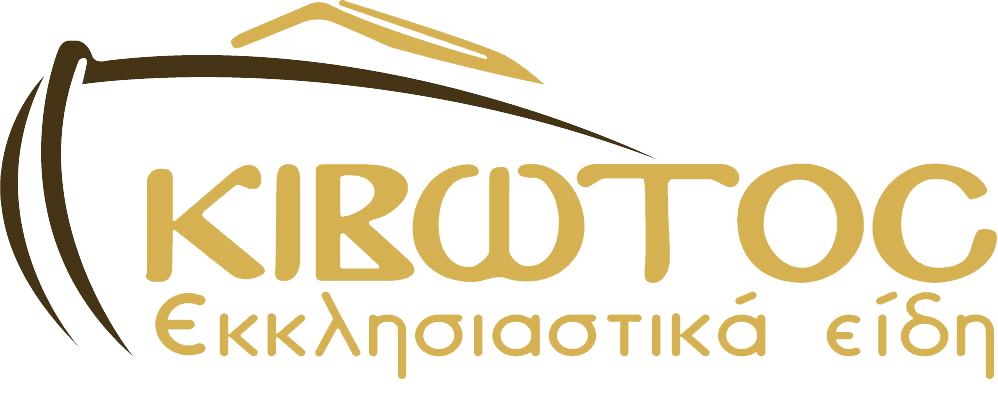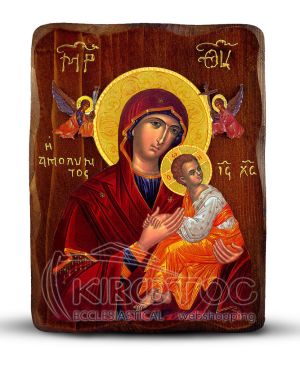Orthodox Icon Saint Paisios
The Orthodox Icon of Saint Paisios is lovingly crafted in natural poplar wood. Its technique is lithography, while the wood is carved with a wavy outline that gives a modern touch to the icon.
Its embossed representation makes it a unique piece which requires high craftsmanship to be made. Its special design manages to combine traditional and modern elements, making it the most loved icon design in the customers preferences!
It is manufactured in Greece by experienced craftsmen and is produced in 4 dimensions in order to cover every need. Finally, it is worth noting that it has been specially treated and varnished to have maximum resistance to time and damage.
━━━━━━━━━▼━━━━━━━━━
Saint Paisios
The monk Paisios was declared a Saint of our Church on January 13, 2015 by the Ecumenical Patriarchate of Constantinople. Since then we celebrate his memory on July 12. In the world's consciousness, he was a symbol of the humility and spirituality of monasticism, but also a valuable helper for those in pain in this life.
Baby in the refugee
His real name was Arsenios Eznepidis. He was born in Cappadocia on July 25, 1924. His family of eleven lived there in Farasa. His father Prodromos Eznepidis, his mother Evlambia and his eight siblings. His father was a dynamic and loving man and was the president of the village. Just a few days after his birth, his family was about to have to leave Cappadocia, persecuted by the Turks. Refugees fled to Greece.
Arsenios Eznepidis and the legacy of monasticism
Before their departure they baptized him. The parish priest was Arsenios. He gave his name to the newborn "to leave a monk at his foot", as he wanted. This priest, Arsenios, was recognized by the Orthodox Church as a saint in 1988. In fact, this act had a great effect on little Arsenios Eznepidis, who declared that he wanted to become a monk and always had a piece of paper with him, where he recorded the miracles of Saint Arsenios .
The Eznepidis family first settled in Corfu and finally in Konitsa, where the little boy finished primary school with a very good grade. The art he learned was that of carpentry. His compassion for human suffering, but also his offering was so great from then on, that when he was ordered to build a coffin, he shared so much the family's sadness, but also the poverty of the time, that he did not ask for money.
God's radio operator
In 1945, Arsenios enlisted in the Army. With levity and self-sacrifice he asked that he fight in the front line, instead of family members of infantrymen, so that their family would not suffer from any loss of their lives. In the Civil War (1945-1949) he served as a radio operator. Later, extolling the value of monasticism to some who questioned it, he said that "there are monks who have spiritual television and are radio transmitters of God". He is described in his biography as one of them. His basic teaching was: "If you want to 'catch' God, so that he hears you, when you pray, turn the knob on humility, because God works on this frequency."In 2017, by a decision of the Holy Synod of the Church of Greece, he was declared the patron saint of the military weapon of the Transmissions, in which he had served.
On Mount Athos
As soon as he was discharged from the Army, he went to Mount Athos to become a monk. “The longer one lives the worldly life, the more stress one gains. Only near Christ does one rest, because man is made for God", he argued. As he said later: "When I had come to Mount Athos, I used to go back to the orchard of the Virgin Mary, like all the novices usually do, to find the perfumed flowers of the Virgin Mary - Saint Gerontades - and to get spiritual pollen."
In 1956, and while he was at the Philotheou Monastery near the elder Simeon who had a catalytic effect on the formation of his solitary character, he was ordained a "Crusader" and took the "Small Form". Then he was called "Paisios", thanks to the Metropolitan Paisios II of Caesarea who was his compatriot.
Charity to heterodox as well
His philanthropy was not sealed. "Both physical struggles and labors cannot reconcile us to God, as much as the sympathy of the soul and charity and love of neighbor." In 1958, he became a monk for 4 years at the Holy Monastery of the Nativity of the Virgin in Stomio Konitsi, offering charity work both to mentally troubled and poor Greeks, as well as to heterodox, while in 1962, staying for 2 years on Mount Sinai, he especially helped the Bedouins by giving them food and money he raised by selling wooden crosses he made. "Kindness softens and opens the heart, like oil a rusty lock," he used to say.
Miracle worker and healer
Returning in 1964 to Mount Athos, he stayed in the Skete of the Holy Forerunner of Iberia until 1979, when he settled in the abandoned cell in Panagouda, where multitudes flocked to draw wisdom, strength and grace from the Elder Paisios. "In our time, unfortunately, logic has shaken faith and filled souls with doubts. Thus, the next thing is to deprive ourselves of miracles, because the miracle is lived and cannot be explained", he said. He gained a great reputation as a miracle worker and healer.
The end of his worldly life
Even though he was sick, he countered the physical suffering, continued the ascetic life and manual work. In 1994 he was operated on for colon cancer and in the same year his body succumbed to metastases. He considered cancer a fulfillment of his request to God and beneficial for his spiritual health. Besides, he had said: "God does not allow any sorrow or any evil, if something better than what we as humans thought was everything does not come out of it!"
Orthodox Church celebrates his memory on July 12
©The texts were edited exclusively for the website www.ekivotos.com and are legally protected. Any reproduction of them for commercial purposes is considered unfair competition and is criminally prosecuted.
Orthodox Icon Saint Paisios



























Validate your login
Sign In
Create New Account